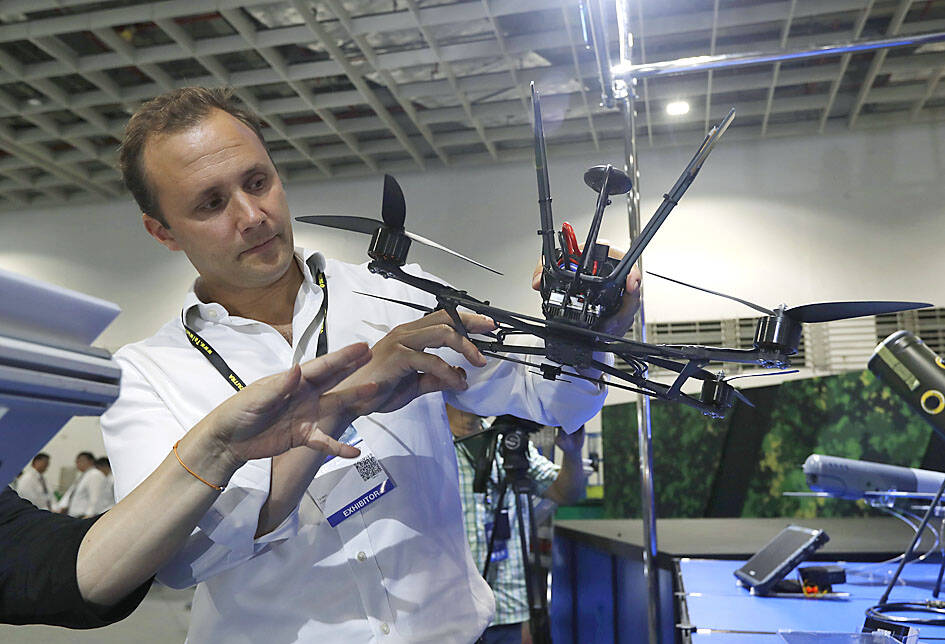Auterion LLC, a start-up that provides software to military drones, has raised US$130 million to expand its operations abroad, including in geopolitical hotspots Ukraine and Taiwan, a further sign that private investors are pouring money into defense.
Bessemer Venture Partners LP led the financing round, which includes existing Auterion investors Lakestar LP and Mosaic Venture Lab, the company said in a statement on Tuesday. Auterion chief executive Lorenz Meier said the funding gives his company a valuation “north of” US$600 million, but declined to provide specific terms.
The start-up is part of a wave of small defense companies attracting record amounts of capital as investors eye windfalls from increased defense budgets across Europe. Drones have become ubiquitous in the Ukraine war, and NATO militaries are increasingly searching for ways to deploy the uncrewed vehicles in an air defense role after Russian incursions over Poland and Estonia.

Photo: Chiang Ying-ying, A
Formed in Zurich in 2017, Auterion initially serviced delivery drones. After Russia’s full-scale invasion of Ukraine in 2022, the start-up pivoted to defense, selling an operating system designed to give uncrewed aircraft better navigation and targeting capabilities.
Meier said Auterion makes drones cheaper and more effective with its autopilot and tools for “swarming,” in which multiple aircraft operate in coordination. Prominent competitors, such as Anduril Industries Inc and Helsing SE, also make drone hardware, but Meier said Auterion’s focus on software lets it work with multiple drone manufacturers and large defense contractors, likening its approach to that of Microsoft Windows.
“We’re software — simple, for everybody,” Meier said in an interview. “Our open approach is what the customer wants and needs.”
The company, based in Arlington, Virginia, is “close to” US$100 million in revenue and has turned cash flow positive, Meier said.
Auterion would use the fresh money for internal and external expansion, he said. The company plans to add teams and open new offices, as well as buy companies making applications that work with its drone system.
Auterion signed a US$50 million contract this year with the US Department of Defense to prototype low-cost, long-range weapons in partnership with an unnamed Ukrainian dronemaker.
In June, Auterion said it agreed to a multi-year deal to provide software to the Taiwanese military.
The company’s technology is already at work in Ukraine as a common operating platform to turn the hundreds of drone brands flying in the country into a coordinated swarm, he said, adding that the company would announce contracts with two European countries “soon,” without offering details.
Last year, Auterion announced a partnership with a German defense company Rheinmetall AG to develop software for drones. Meier declined to provide details about the partnership.
Auterion has now raised US$195 million to date, far less than some rival start-ups that build hardware.
“Right now, we’re a little company that’s growing really fast,” Meier said. “It sounds crazy, but if you look back, Windows and Android won the battle.”

RECYCLE: Taiwan would aid manufacturers in refining rare earths from discarded appliances, which would fit the nation’s circular economy goals, minister Kung said Taiwan would work with the US and Japan on a proposed cooperation initiative in response to Beijing’s newly announced rare earth export curbs, Minister of Economic Affairs Kung Ming-hsin (龔明鑫) said yesterday. China last week announced new restrictions requiring companies to obtain export licenses if their products contain more than 0.1 percent of Chinese-origin rare earths by value. US Secretary of the Treasury Scott Bessent on Wednesday responded by saying that Beijing was “unreliable” in its rare earths exports, adding that the US would “neither be commanded, nor controlled” by China, several media outlets reported. Japanese Minister of Finance Katsunobu Kato yesterday also

Taiwan’s rapidly aging population is fueling a sharp increase in homes occupied solely by elderly people, a trend that is reshaping the nation’s housing market and social fabric, real-estate brokers said yesterday. About 850,000 residences were occupied by elderly people in the first quarter, including 655,000 that housed only one resident, the Ministry of the Interior said. The figures have nearly doubled from a decade earlier, Great Home Realty Co (大家房屋) said, as people aged 65 and older now make up 20.8 percent of the population. “The so-called silver tsunami represents more than just a demographic shift — it could fundamentally redefine the

China Airlines Ltd (CAL, 中華航空) said it expects peak season effects in the fourth quarter to continue to boost demand for passenger flights and cargo services, after reporting its second-highest-ever September sales on Monday. The carrier said it posted NT$15.88 billion (US$517 million) in consolidated sales last month, trailing only September last year’s NT$16.01 billion. Last month, CAL generated NT$8.77 billion from its passenger flights and NT$5.37 billion from cargo services, it said. In the first nine months of this year, the carrier posted NT$154.93 billion in cumulative sales, up 2.62 percent from a year earlier, marking the second-highest level for the January-September

‘DRAMATIC AND POSITIVE’: AI growth would be better than it previously forecast and would stay robust even if the Chinese market became inaccessible for customers, it said Taiwan Semiconductor Manufacturing Co (TSMC, 台積電) yesterday raised its full-year revenue growth outlook after posting record profit for last quarter, despite growing market concern about an artificial intelligence (AI) bubble. The company said it expects revenue to expand about 35 percent year-on-year, driven mainly by faster-than-expected demand for leading-edge chips for AI applications. The world’s biggest contract chipmaker in July projected that revenue this year would expand about 30 percent in US dollar terms. The company also slightly hiked its capital expenditure for this year to US$40 billion to US$42 billion, compared with US$38 billion to US$42 billion it set previously. “AI demand actually